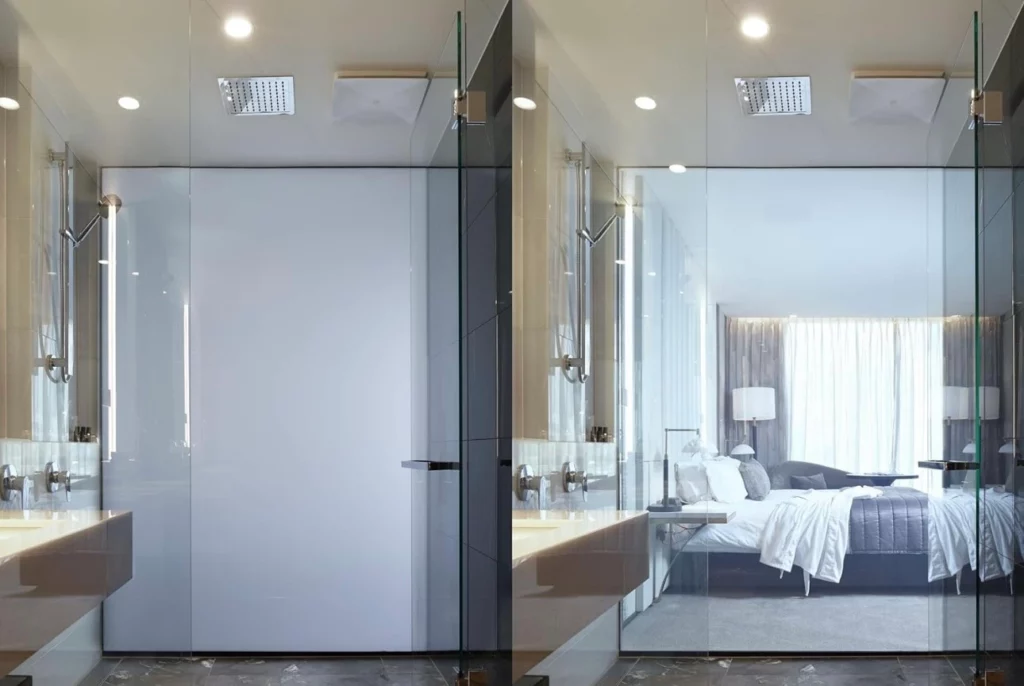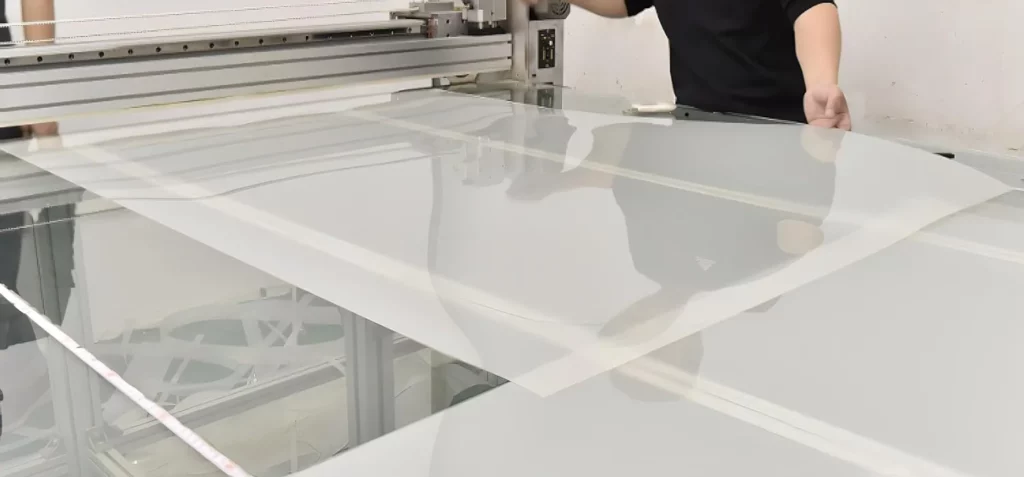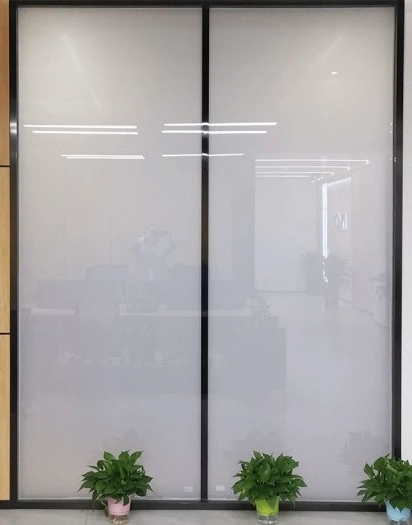Smart Film Technology: Transforming Privacy and Comfort on Demand

Smart Film Technology: Transforming Privacy and Comfort on Demand Smart film, also known as switchable glass film, has reshaped the way we experience privacy and comfort in our spaces. This technology allows you to change a window’s transparency with ease, adapting your surroundings in real time. From modern offices to luxury homes, smart film integrates functionality, aesthetics, and energy efficiency. Let’s explore what makes smart film an essential upgrade for today’s spaces. What Is Smart Film and How Does It Work? Smart film, a cutting-edge addition to glass technology, works by using Polymer Dispersed Liquid Crystal (PDLC) technology. This allows the film to transition between transparent and frosted states. When powered on, the liquid crystals align, letting light pass through for a clear view. When powered off, the crystals scatter, creating a frosted, privacy-friendly finish. This dynamic control over visibility enhances spaces by offering flexibility without the need for heavy blinds or shades. Key Benefits of Smart Film for Modern Spaces Smart film offers unique advantages, catering to the privacy and aesthetic needs of diverse environments: Privacy on Demand: Ideal for spaces where privacy is required only occasionally, such as conference rooms, bathrooms, or storefronts. You can go from open to private in seconds. Energy Efficiency: The film reduces UV exposure and heat transfer, which helps maintain a comfortable indoor temperature, lowering heating and cooling costs. Adaptability and Style: Unlike fixed solutions, smart film adapts instantly. It allows you to have an open view or a private atmosphere as needed, fitting seamlessly with any décor style. Popular Applications of Smart Film Technology Smart film serves various purposes across residential, commercial, and public settings. Here’s a closer look at how this innovation enhances different environments: 1. Commercial Spaces and Offices In offices, smart film supports productivity and confidentiality by offering privacy for meeting rooms or personal workspaces. This dynamic glass technology enhances both employee comfort and corporate aesthetics. It also creates an inviting atmosphere for clients by enabling visibility or privacy on command. 2. Luxury Homes and Apartments Smart film is an asset in luxury residences, particularly in rooms like bathrooms, bedrooms, and even large living areas. Homeowners can enjoy expansive views while maintaining privacy and controlling the natural light entering their space. When linked to smart home systems, managing privacy and lighting from a smartphone or voice assistant is effortless. 3. Retail, Hospitality, and Healthcare For retail and hospitality, smart film acts as a design and privacy solution, enhancing customer experience. In hotels, it allows guests to create private spaces, while healthcare facilities can use it for patient privacy without compromising cleanliness, unlike curtains. Enhancing Comfort and Energy Efficiency with Smart Film Switchable smart film also adds significant energy-saving benefits: UV and Heat Reduction: When frosted, smart film minimizes UV exposure, reducing heat influx during warmer months and contributing to a more comfortable and energy-efficient environment. Seasonal Temperature Control: By maintaining consistent interior temperatures, smart film lessens the need for heating or air conditioning, effectively lowering energy bills and supporting sustainable practices. Integrating Smart Film into Your Smart Home Smart film takes privacy control further by integrating with smart home systems, allowing you to manage your windows from anywhere. Control options are available via smartphone apps, voice commands (compatible with Alexa or Google Home), and centralized smart home systems. This creates a responsive, personalized living space that adapts to your preferences. How to Know If Smart Film Is Right for You If privacy, energy efficiency, and sleek aesthetics are high on your list, smart film might be the solution you’re looking for. Here are a few questions to help determine if it’s a good fit: Do you want adaptable privacy for your space? Are you seeking energy savings without compromising natural light? Do you appreciate the convenience of smart home integration? If you answered “yes” to any of these, smart film could be an excellent investment. Final Thoughts on Smart Film Technology Smart film offers a revolutionary way to manage privacy, light, and energy efficiency in any space. With its transparent-to-frosted adaptability, smart film is more than a window covering—it’s a versatile solution that enhances any environment. Explore the possibilities with smart glass film and discover how this advanced technology can elevate your space while meeting modern demands for efficiency and comfort.
What Is Smart Glass? Uses, Benefits, and Costs Explained

What Is Smart Glass? Uses, Benefits, and Costs Explained Smart glass is a revolutionary technology that brings adaptability and modern functionality to glass surfaces, allowing them to shift between transparent and opaque states with the press of a button or even automatically. This versatile feature has made smart glass increasingly popular in homes, offices, and other commercial spaces. In this guide, we’ll dive into what smart glass is, its uses, benefits, and the costs associated with installing and maintaining it. Understanding Smart Glass: What Is It? At its core, smart glass (also known as switchable glass) is a type of glass that can change its transparency level based on external stimuli such as electricity, light, or heat. The most common types of smart glass work by applying a low voltage of electricity that changes the glass from clear to opaque. This switchable feature offers privacy on demand, making it an attractive choice for many applications. There are several types of smart glass technologies, including: Electrochromic Glass: Uses a small electrical charge to change color and reduce sunlight. PDLC (Polymer Dispersed Liquid Crystal) Smart Film: Switches between opaque and transparent states using a remote or wall switch. Thermochromic and Photochromic Glass: Reacts to heat and light, adjusting transparency based on temperature and brightness. These options allow consumers to choose smart glass tailored to specific needs, whether for energy savings, privacy, or both. Popular Uses of Smart Glass 1. Residential Use: Privacy and Energy Efficiency In homes, smart glass is typically installed in bathrooms, bedrooms, and living areas where privacy is desired without sacrificing natural light. It also helps regulate indoor temperatures by blocking excess sunlight, thus lowering cooling and heating costs. 2. Office and Corporate Spaces Smart glass is a popular choice in offices, especially for conference rooms and open workspaces. It provides a quick solution for privacy, allowing rooms to be transformed from open and collaborative to private and closed with ease. Additionally, smart glass enhances the look of an office, creating a modern and tech-savvy appearance. 3. Hotels and Hospitality Hotels have adopted smart glass to offer guests a luxurious and customizable experience. For example, smart glass in bathrooms allows for privacy when needed while creating a spacious, open look when turned off. It’s also used in hotel room windows to reduce sunlight and improve comfort for guests. 4. Healthcare Facilities In hospitals and clinics, smart glass provides privacy in patient rooms while maintaining a clean, sanitary environment. Unlike traditional curtains, smart glass is easier to disinfect and doesn’t need frequent replacements. 5. Automobiles Some vehicles now feature smart glass in windows, sunroofs, and side mirrors. The technology provides better temperature control, reduces glare, and adds a touch of luxury to the vehicle’s design. These varied applications show just how adaptable smart glass is, providing customizable solutions for privacy, aesthetics, and energy efficiency across different settings. Benefits of Smart Glass Smart glass comes with a host of benefits, making it a valuable addition to both residential and commercial properties. Here are the primary benefits: 1. Enhanced Privacy One of the most sought-after benefits of smart glass is its ability to provide privacy on demand. This is especially useful in places like bathrooms, meeting rooms, and bedrooms, where you may want flexibility between an open and private space. 2. Energy Efficiency and Cost Savings By controlling the amount of sunlight entering a space, smart glass can reduce energy costs associated with heating and cooling. The glass blocks excess heat on hot days and helps retain warmth during colder months, which translates to lower energy bills. 3. Improved Aesthetics and Modern Design Smart glass adds a sleek, modern look to any space, making it an attractive option for homes and businesses that prioritize design. Its high-tech appearance can enhance property value and appeal to forward-thinking buyers. 4. UV Protection Smart glass can also protect interiors from harmful UV rays, which can damage furniture, flooring, and artwork over time. The glass acts as a shield, blocking up to 99% of UV rays. 5. Noise Reduction Smart glass provides an additional layer of sound insulation, making it ideal for busy environments like offices, homes near high-traffic areas, or even healthcare facilities where a quieter space is preferred. These benefits make smart glass a versatile choice for anyone looking to combine style, functionality, and sustainability in their space. How Much Does Smart Glass Cost? The cost of smart glass can vary significantly based on factors such as the type of glass, installation requirements, and the size of the project. Here’s a breakdown of cost considerations: 1. Per Square Foot Price On average, smart glass costs between $50 and $150 per square foot, depending on the technology used. For instance, PDLC smart film is generally more affordable than electrochromic glass. It’s essential to consider these costs upfront to determine which option fits your budget. 2. Installation Costs In addition to the cost of the glass itself, professional installation can add to the overall price. Installation charges can vary depending on the complexity of the setup. For larger installations, such as entire windows or walls, labor costs will be higher than for smaller applications like bathroom dividers or car windows. 3. Long-Term Savings Although the initial investment may seem high, smart glass can provide long-term savings by reducing energy bills. This return on investment (ROI) makes it an appealing choice for people looking to make their spaces more sustainable. 4. Maintenance and Repairs Maintenance costs for smart glass are relatively low. Smart glass typically requires only regular cleaning, much like traditional glass. However, any electrical issues in the wiring or control systems may require occasional repairs, which could add to the long-term cost. Final Thoughts on Smart Glass Technology Smart glass is transforming the way we think about windows and other glass surfaces. From its customizable privacy features to energy-saving capabilities, smart glass offers a powerful solution for anyone wanting to modernize their space. While the initial cost might be higher than traditional glass, the
What is Smart Film? What are the Benefits of It

What is Smart Film? What are the Benefits of It Smart film, also known as switchable film or PDLC (Polymer Dispersed Liquid Crystal) film, is a unique type of technology applied to glass surfaces, allowing them to switch from transparent to opaque with a simple electric control. This thin, flexible film is used on windows, doors, partitions, and other glass applications, creating privacy and versatility in both residential and commercial settings. What is Smart Film? Smart film is a specialized material designed to give glass the ability to change its appearance. In its basic form, smart film is a sheet that can be attached to existing glass surfaces to control the level of transparency. When the film is installed, it allows the user to switch between a clear and frosted state instantly. It doesn’t require glass replacement, making it ideal for quick installations and retrofits. The technology behind smart film relies on liquid crystal molecules embedded within the film’s structure. When power is applied, these molecules align in such a way that they allow light to pass through, making the glass appear clear. Without power, the molecules scatter, turning the glass frosted and providing privacy. What are the Benefits of Smart Film? Smart film has gained popularity due to its numerous advantages over traditional privacy solutions like blinds, curtains, and tinted glass. Here’s why smart film is becoming a preferred choice in modern architecture and design: Privacy on Demand Smart film provides instant privacy whenever it’s needed. A simple switch allows you to change the glass from clear to opaque, giving you complete control over visibility in your space. This is particularly useful for conference rooms, bathrooms, and open office layouts. Easy Installation and Versatility Unlike permanent glass replacements, smart film can be directly applied to any existing glass. This means that it’s possible to retrofit old windows and doors without extensive renovations. The film can be cut and shaped to fit custom glass sizes, giving flexibility to architects and designers. Reduces UV Exposure Smart film blocks out a significant amount of harmful UV rays, which can help protect interiors from sun damage. Furniture, carpets, and artwork will last longer with reduced exposure to UV, keeping them in good condition over time. Energy Efficiency By controlling sunlight and glare, smart film can help maintain comfortable indoor temperatures. In its opaque state, it blocks out heat, keeping spaces cooler in the summer, while in winter, it can retain warmth. This makes it an energy-efficient choice, reducing heating and cooling costs. Reduced Glare and Improved Visibility In spaces with a lot of natural light, glare can be a concern, especially in work environments with screens. Smart film can be set to a frosted state, reducing glare and creating a more comfortable space for work, relaxation, or viewing screens. Enhanced Security Smart film adds an extra layer to glass, increasing its strength and making it more difficult to break. When set to opaque, it also obscures visibility from the outside, which can deter potential intruders or prying eyes. Low Maintenance Unlike blinds and curtains that can collect dust and require regular cleaning, smart film is easy to maintain. A simple wipe with a cloth keeps it clean, and there are no mechanical parts that could wear out or require servicing. Conclusion Smart film has revolutionized how we think about privacy and design. This innovative material transforms ordinary glass into a customizable privacy solution, making it a valuable addition to modern interiors. For those interested in taking this technology further, smart glass film combines similar benefits with the durability of smart glass. To learn more, check out our smart glass film, where you can discover how this advanced solution can enhance both privacy and energy efficiency in your space.
